Today, we’re reviewing the WaterRower Natural rowing machine with S4 monitor. Based on the current product page, they’ve removed “Natural” from the name, so it’s now called the “WaterRower Ash Rowing Machine with S4 Monitor”.
So, in this review, the word “Natural” refers to the light-stained ash wood rower with the S4. This machine belonged to the “Natural” line of rowers, which I suppose they’ve dropped, hence the name change. This is common in the industry.
I’ve used two ash WaterRowers before, one with the S4 (the Natural) and the A1 rower when it was available in ash.
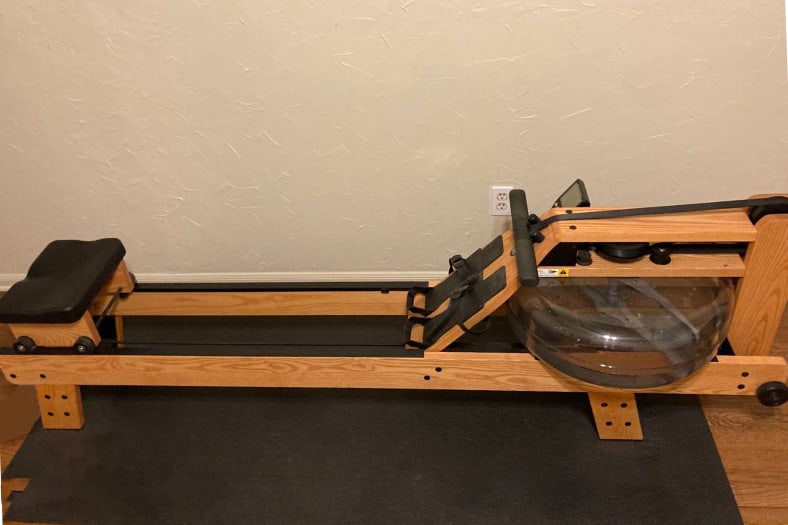
With the advanced monitor, I liked the Natural a lot more!
In short, the WaterRower Natural rowing machine is one of the best water-resistance rowers. Compared to other rowing machines of its kind, it’s more expensive (typical of the brand), made of solid wood (not particleboard), and features the best monitor for water rowing machines.
Compared to other wooden rowers from the WaterRower brand, the Natural is made of ash wood instead of oak, cherry, or walnut. Like most wooden WaterRower models, the Natural has a dual rail system, a light wood stain, and comes with their best monitor, the S4.
Overall, it’s a beautiful machine that offers the best quality water resistance and a smooth rowing stroke.
If you are in the market for a water rower, you really can’t get much better than this model!
Quick note: WaterRowers range in price with most models in the ~$1000-$2500 range. The Ash with S4 is usually on the low end of that range depending where you buy it. The lowest price will include free shipping.
The original WaterRower. Quieter than expected with a smooth rowing stroke very close to actually rowing on the water. Gorgeous design. Stores in a surprisingly small space.
- Smooth water-like rowing feeling
- Hand-made in USA 🇺🇸
- Great warranty
- The S4 monitor is adequate, but as good as the PM5 on the Concept2
WaterRower Natural Rowing Machine Review
Resistance Type
WaterRower is the name brand, but “water rower” is generically used to describe water-resistance rowers. This type of machine uses a “water flywheel” or paddles suspended in a tank of water to provide resistance for the rower.
As a user pulls the handle, it spins the paddles in the water tank. The spinning paddles must displace the water which requires effort depending on how fast you pull and the amount of water in the tank.
The faster you row, the faster the paddles spin, the more water they must displace, increasing the difficulty.
We call this ‘variable’ resistance because there are no “adjustments” to be made. For more resistance, row faster. To cool down or catch your breath, row slower.
An air rower operates much this way but differs slightly. You can read my water vs air rowing machine comparison for more details about both.
You can also read more about all the different resistance types by clicking here.
Resistance Benefits
There are a lot of benefits to water resistance, especially the Natural’s resistance system.
WaterRower is known for providing one of the smoothest rowing motions on the market. The resistance is smooth, strong, and quiet from start to finish. No user mentioned any lag in the rowing stroke and felt resistance from the start. My experience has been the same.
As for the variable resistance, according to the WaterRower website, “a doubling of the speed of the boat will require an eight-fold increase in resistance”. Basically, by going faster, you’re met with a disproportionately greater amount of force!
In addition to speed, add water to the tank for more resistance or remove water for less.
The more water you add, the heavier the stroke will feel (as in a boat with passengers). The less water you have, the “lighter” the stroke will feel (as in a boat by yourself).
The Natural provides a very realistic motion and rowing experience because it closely mimics the resistance felt when you row on the water. Most like the sound of the water splashing, so noise is rarely a complaint.
So, from your own home, you in many ways get the experience of being on the water.
Many people find the noise to be meditative and it is also quiet enough so people in a neighboring room cannot hear the rowing machine.
As for the total body workout that you’ll get, I’ve yet to hear any complaints from users about not getting a good enough upper or lower body workout when using WaterRower machines.
Monitor/Control Panel
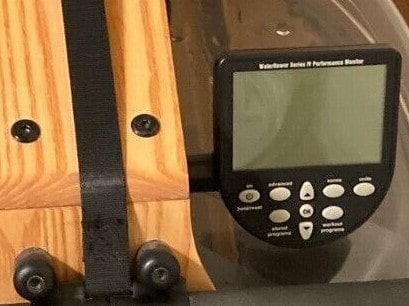
The WaterRower Natural Rowing Machine comes with an S4 (series 4) multi-functional fitness monitor. It tracks the following fitness data:
- Time
- Distance
- Intensity
- Strokes per Minute
- Heart Rate
The S4 displays all the tracked information (in addition to program information) in separate “windows” that can all be seen on the “home screen” at the same time.
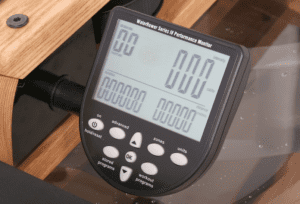
Here’s a quick breakdown of what’s displayed:
Intensity window:
- Displays rowing speed in meters per second, miles per hour, minutes per 500 meters, and minutes per 2 kilometers
- Also displays power and calories burned per hour
Stroke rate window:
- Displays the number of strokes per minute
Heart rate window:
- *Option is available when optional heart rate monitor is used
- Displays beats per minute
Target zone [bar] window:
- Displays target zone readings for intensity, heart rate, and stroke rate
Duration window:
- Displays time rowed in hours, minutes, seconds, and decimal seconds
- Can also display the time remaining in the current workout (if a predetermined time for the workout has been established)
Distance window:
- Displays distance rowed in meters, miles, kilometers, or strokes
- Can also display the distance remaining in the current workout (if a predetermined distance for the workout has been established)
Program window:
- This window is used to help the user navigate through the advanced functions
There are 9 buttons, 6 quick select (shortcut) buttons, and 3 navigation buttons.
It’s powered by 4 AA batteries (included). It’s not backlit, so you will need some light to view the screen while rowing.
Additional Features
S4 monitors can be linked to a computer (required cable not included) to use in conjunction with other software to train, race, and upload your fitness data to analyze your workouts.
Popular S4 computer software includes We-Row (WaterRower’s own software), NetAthlon, UltraCoach, and Rowyo.
Monitor Downsides
While the S4 is the best monitor for water rowers, some folks (typically those used to the Concept2) find it to be a bit too basic. I’ve used both (Concept2’s PM5 monitor and the S4) and while the S4 is great, it’s nowhere near the PM5.
This mainly has to do with water rowers not being able to record data as accurately as air rowers. This is why air rowers are the chosen type of Olympic rowers and why they’re used for setting records and comparing race times.
These shortcomings won’t be an issue unless you plan to get deep into the hobby, compete in competitions, or join a CrossFit gym or rowing studio where you’d almost certainly be using the Concept 2.
Monitor Overall
The WaterRower S4 Performance monitor may not be the best but it is more than enough for the average user.
If you want to compare your times to Olympic Rowers and race against people around the world, then you may be more interested in the PM5 which you’ll get with the Concept2 RowErg Indoor Rower.
However, if you are just looking to get a great at home workout and track all the necessary fitness data (plus more!), then the S4 Performance Monitor is perfect.
Quality and Durability
Budget wood rowers are often made of dense particleboard to help cut costs.
Like most high-end options, the WaterRower Natural Rowing Machine is made of natural, solid wood, which makes it super sturdy.
Solid ash wood makes the machine durable and ideal for absorbing sound and vibration. Each unit is then hand finished and stained in Honey Oak for color consistency.
I haven’t heard of or read any complaints of the creaking or squeaking sounds often reported with lower-end machines.
I get a sturdy and secure feel when using WaterRowers at max intensity that isn’t matched by the budget options. I’m far from the biggest and strongest guy in the world (I’m 175 lbs/80 kg), but heavier users say the same. I see no reason why it couldn’t last a lifetime.
WaterRower even makes high-quality machines made of steel like the rowing machine featured in OrangeTheory.
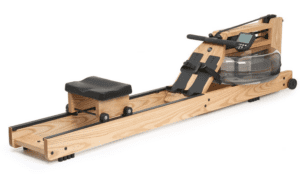
The water tank is made of polycarbonate (one of the strongest plastics on the planet) and is virtually indestructible. The only “maintenance” required is to put the included chlorine tablets in the water periodically to keep it looking clear.
One user commented that over his 10+ year ownership of this rower, the only parts he’s had to replace so far are the performance monitor’s battery and the tape that attaches its wire brackets to the frame.
Below is a WaterRower in action. The finish is slightly different than the WaterRower Natural but everything else is exactly the same.
Comfort
The molded seat has an ergonomic design and comes with extra padding to provide comfort for prolonged sitting. A few users commented on how this seat was the most comfortable they’ve experienced.
The handle is durable and light because it’s made of aluminum. Its tear-drop shape makes it easy to grip and also minimizes any development of wrist problems such as tendonitis because it virtually eliminates any wrist torque.
The footboard has heel rests at the bottom and uses nylon straps to secure the user’s feet in place. It can accommodate practically any shoe size (big or small) and it takes seconds to change footrest sizes.
Comfort Complaints
Overall, most consider the machine comfortable, but there are a couple of minor gripes.
A few users mentioned that it’s difficult to get on and get off of the WaterRower Natural Rowing Machine because it sits low to the ground. Although, at least at one time, it was available with some elevation.
The issue is minor and users suggested having a chair right next to the WaterRower to assist you if you have difficulty getting to the seat.
Some complain that the nylon straps used to secure your feet in place would loosen up a bit in the middle of their workout. Others mentioned that it’s nearly impossible to row without any shoes on because the heel rests are rough and will hurt the heels of your feet.
This is not good for people that like to row barefoot, but I’m sure there are ways around this issue such as adding padding of some sort to the base of the heel rests or wearing socks.
The design of the footrest may need some work but it’s completely functional and there have been no complaints about it breaking from any user.
Bottom Line
One of the best comfort features is the rowing motion itself, which users describe as the most comfortable stroke on the market.
The WaterFlywheel technology provides a feel (and sound) that closely resembles rowing on water.
The sprag clutch prevents any jerkiness when the handle is pulled and the seat rolls on 8 heavy-duty wheels making the entire motion smooth from the catch to the recovery.
Storage

The rower has a fairly large footprint when in use, but can easily be stood upright for storage.
Although the unit is heavy, it takes very little effort to stand it up on its base (I can do it one-handed and I’m not the strongest guy in the world – believe me).
It comes with dual caster wheels to help move it when needed.
Capacity: Max User Weight and Height
According to the specs, the weight capacity of the rower is 1,000 pounds (454 kg). I contacted WaterRower and confirmed with them that 1,000 pounds (454 kg) is the maximum capacity.
The seat track of the machine is fairly long and the seat has a movement length of 43 inches (109 cm).
Folks of all height levels have used this rower with no issues. I’ve seen pre-teen children to adults as tall as 6’6” (198 cm) use the rower without hitting the back end.
The WaterRower website states that the wood rails can accommodate inseams of up to 38.0″.
Based on what I’ve found so far, if you’re taller than 6’7” (200 cm), I would try out a unit at a local fitness retailer or gym to make sure it will accommodate your size. Otherwise, this rower should be fine for everyone else.
Dimensions
- In-Use (L x W x H):
- 83.0″ x 22.0″ x 21.0″
- 211 cm x 56 cm x 53 cm
- Stored/ Upright (L x W x H):
- 21.0″ x 22.0″ x 83.0″
- 53 cm x 56 cm x 211 cm
- Weight:
- 117 pounds [53 kg] (full tank)
- 73 pounds [33 kg] (empty tank)
Pros and Cons
Pros:
- Solidly built
- Smooth and realistic rowing motion
- Ashwood and Honey Oak finish
- Easy to assemble
- Dual caster wheels
- Easy “upright” storage
- Comfortable seat & handle
- Variable resistance adjustment determined by how fast you row
- Can further adjust the intensity level by adding/ subtracting water
- Can link S4 to a computer for advanced features
Cons:
- Price can be high
- The S4 lacks several advanced features of Concept2’s PM5 monitor
Warranty
- Frame: 5 years*
- Parts: 3 years*
*Requires completion of a registration form. Otherwise, the warranty is 1 year.
Price
The price of the WaterRower Natural Rowing Machine is higher than most rowers on the market, but in the mid to low range compared to other WaterRower models.
Cheaper wood options available by the brand include the Oak equivalent of this model (also with the S4) and the A1 Oak (monorail with the lower-tech A1 monitor).
After the Natural, their wood rowers get increasingly expensive depending on the type of material (Walnut, Cherry, etc.) and whether they come with a special app.
WaterRower sells their models on a few online retailers but they all seem to sell for the same price. Major retailers usually have the best prices on rowing machines via free shipping on qualified orders. They also have the best return policies.
WaterRower Natural Rowing Machine with S4 Monitor Review: Conclusion
The WaterRower Natural Rowing Machine is one of the best water-resistance rowers on the market. It has a beautiful design, plenty of intensity, and a smooth rowing stroke.
If you are in the market for a water rowing machine, you really can’t do much better!
WaterRower offers several wooden dual-rail models, but for the most part, they’re near-identical and differ in price mostly due to the type of wood used. Ashwood is perhaps the least fancy (hence the relative price), but is super durable and looks great.
You can visit my Compare Rowing Machine page to see the full WaterRower lineup.
One very similar WaterRower model is the WaterRower Club Rowing Machine. It functions the same as the Natural WaterRower but has a dark finish.
If you want a slightly downgraded WaterRower for a slightly lower price, you can check out the WaterRower GX Rowing Machine model. It’s been discontinued, but you might be able to find it used.
Of course, if you are interested in an air rower, you can always buy the #1 bestselling rowing machine on the market. The Concept2 RowErg Model D with PM5.
I hope you enjoyed my WaterRower Natural Rowing Machine review! Please feel free to comment with any questions below!

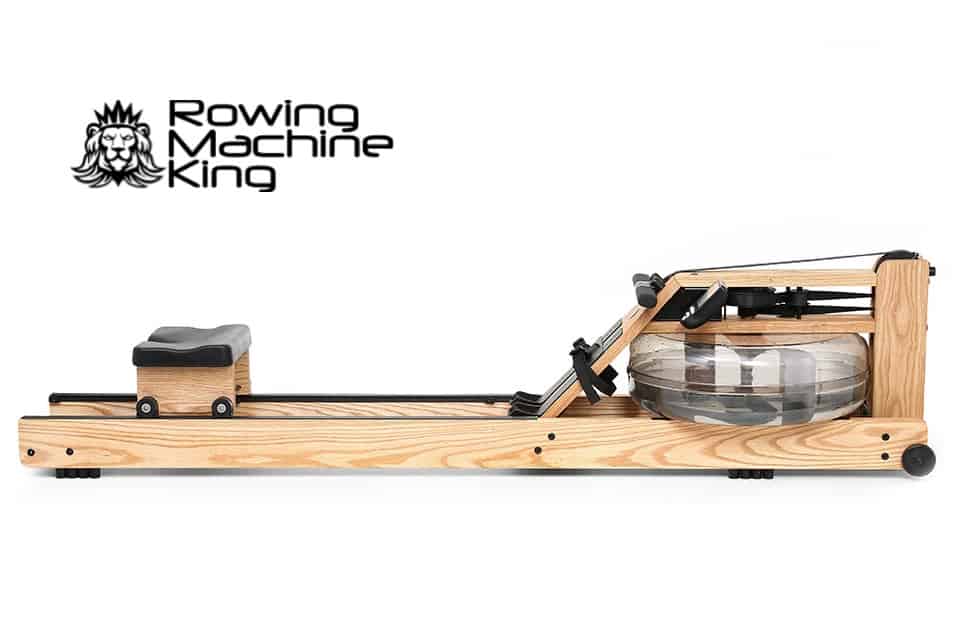
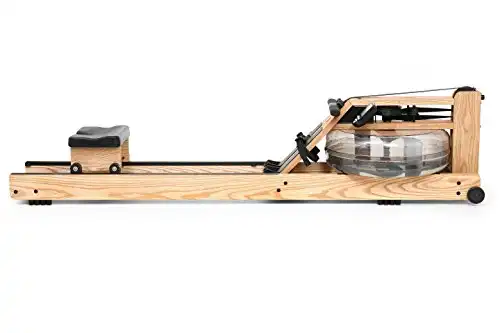
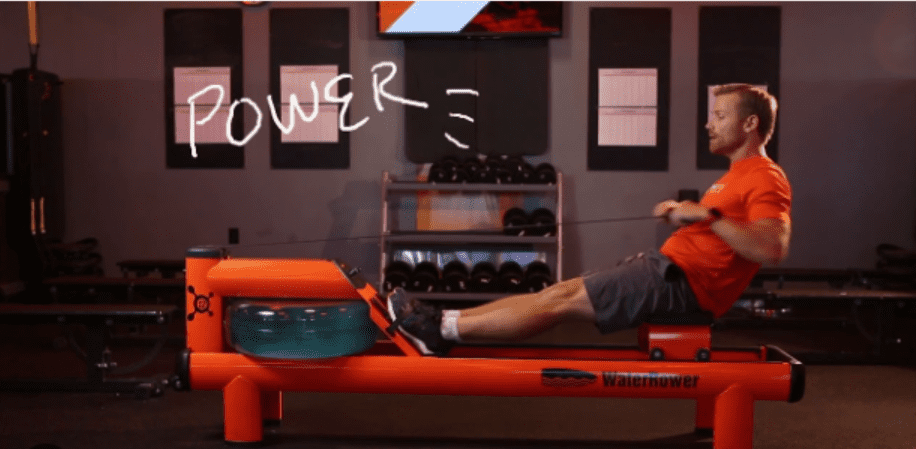
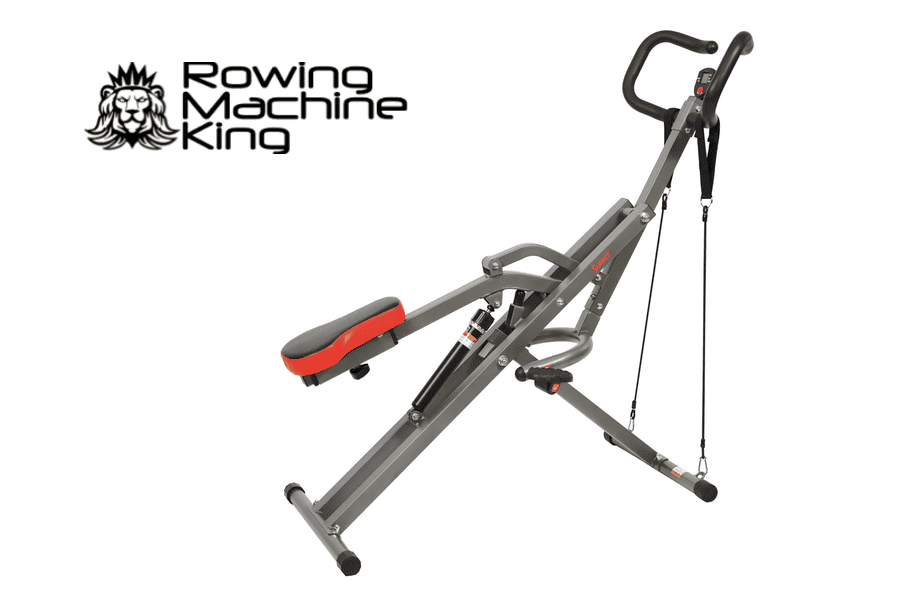
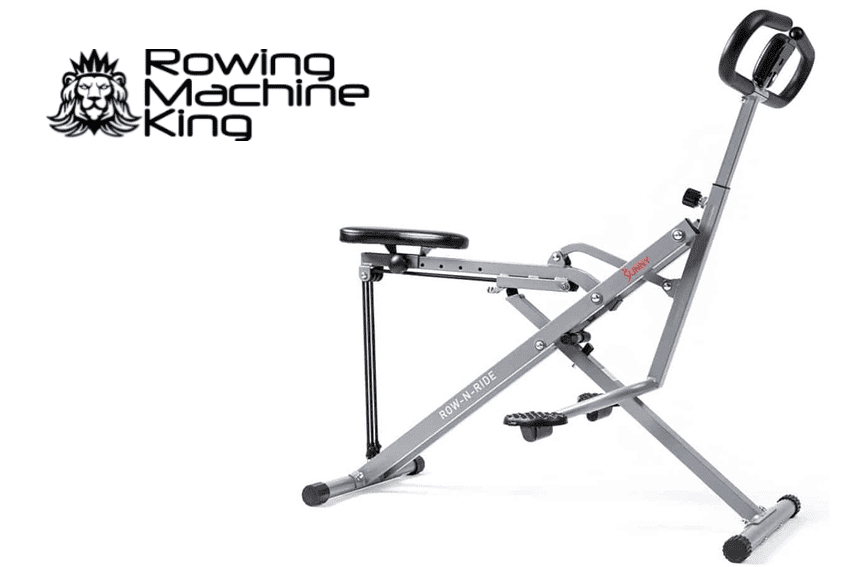
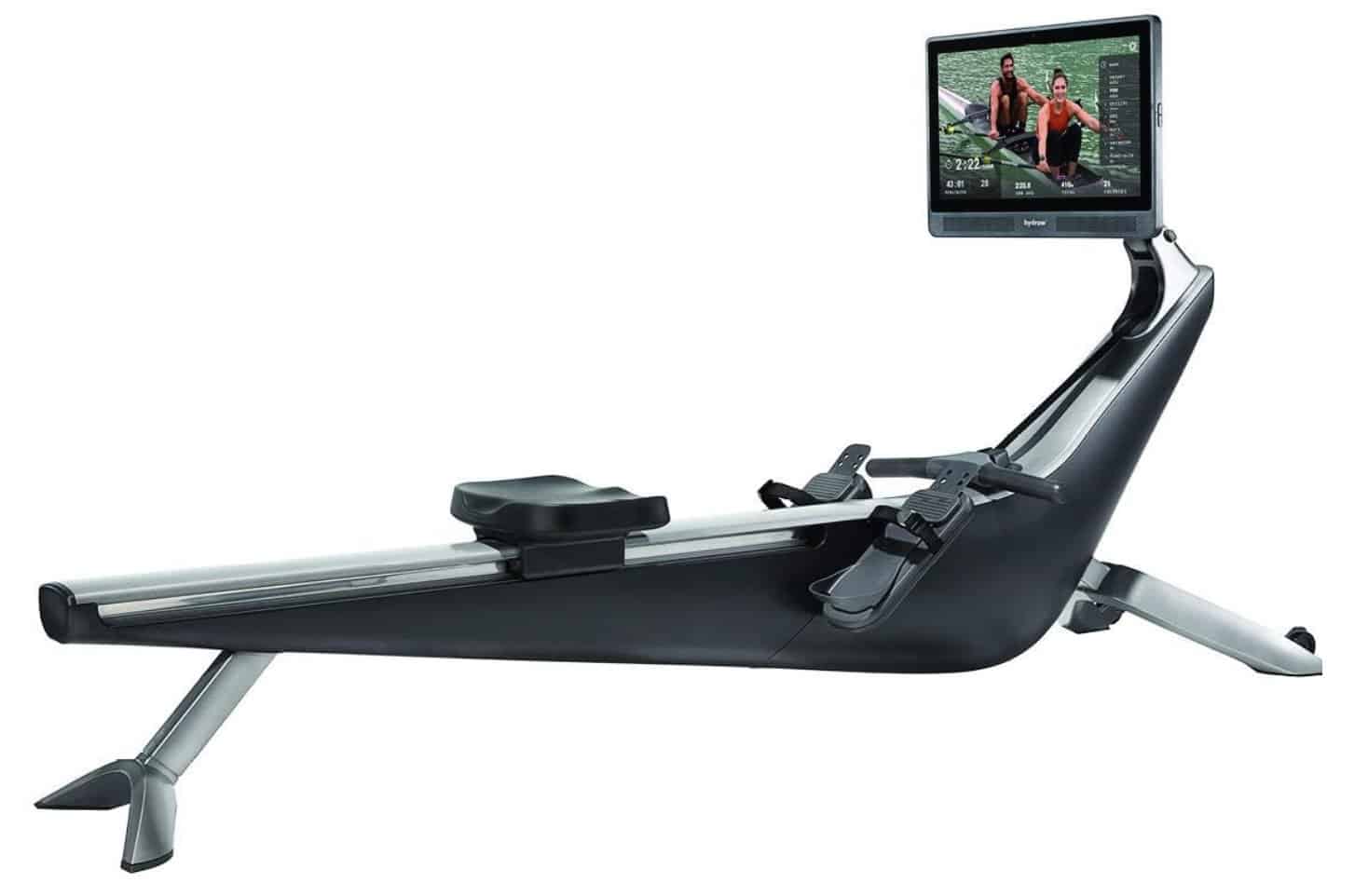


S4 easy to use? Perhaps we have a case of Emperor’s new clothes. It’s 2017, ridiculous multifunction buttons which need to be pressed multiple times to do things not even labelled on the device… this sort of interface should have gone out in the 1990’s. Since most of us have smartphones we have learned that if a device cannot be worked out without a manual, if a device hides any of its important functionality behind ‘secret’ menus, then that device is unacceptably difficult to use.
I’m an IT professional (does it show?) and I love the waterrower but the S4 is an unacceptable POS and the good reports may be when comparing to evenmore arcane, even poorer interfaces that we’ve all seen in the past. It’s time to catch up with the rest of the world. The S4 lets down a wonderful machine.
Is it a way to completley use our smartphones and bypass the S4, meaning I could purchase the AI because I wldnt be using the monitor anyway? Any other major difference with the AI?
I agree about the S4, never really got friendly with it. That is why I got rid of it and bought the SmartRow pulley replacement.
It is far more accurate, works independent of the water volume, uses the same watt to speed calculation as Concept 2, and works with an app that has quite a good UI.
Hello Edwin,
First let me say…WOW! I’ve been reading your website for over an hour now and I’ve only touched the surface. While reading your reviews, articles, etc, one feeling resonates…honesty.
I first saw the WaterRower on House of Cards, what great advertising on their part! I never knew a rower like that existed, actually I know very little about rowers in general. I’ve read that rowers give a low impact, all over body workout. I have 2 questions:
1. I have problems in my cervial and lumbar spine and wonder if rowing might negatively effect me?
2. What are the maintenance instructions for a water rower? Does the water chamber need to be disinfected and water changed often?
Thanks in advance,
Theresa
Hi Theresa,
Thank you so much for the kind words! I work very hard to be honest in my reviews and I appreciate the feedback!
WaterRower did make a very smart PR move by having their rower featured in House of Cards. I bet they didn’t realize how big of an impact it would have! I’m sure it was a nice bump to their bottom line :)
To answer your questions:
1) It is so hard to answer questions on whether a rowing machine will effect people with back issues. I’m by no means a doctor or even someone who knows a lot about spine injuries. I have had people ask similar questions who went on to purchase a rower and didn’t have any issues with their back. However, the lower spine is always a concern for me because rowing requires pivoting back and forth, which to me seems like a lot of pressure/work on the lower spine. I think your best option would be to find a rower locally and test it out. Maybe even join a gym for a month that has a rower and use it a few times a week. That would be better than spending $1,000 on a WaterRower to only find out it causes you back pain.
2) The maintenance on WaterRowers is very, very low. Basically, you fill the tank with water when you first assemble the machine, then you place a chlorine tablet in the water and close the tank. You can add/subtract water from the tank to increase/decrease the “resistance” of the rower but most people keep the level the same. The chlorine tablets last over 6-months and a few come with the machine. So basically every 6-months you can add a tablet and you should never worry about any mold, etc. in the tank.
I hope this helps and let me know if you have any other questions!
Hi Edwin
Thanks for a great site. Magnificient and informative.
My challenge is, that I need a rowing machine for my wife and me. It comes down to Concept2 Model D or WaterRower Natural.
We won’t be using the same resistance when we workout. So will it be easier for both of us to use Concept2, or can we use the WaterRower with the same amount of water in the tank without any problems?
Best Regards
Mads Jakobsen
Hi Mads – thanks for reaching out and for the kind words!
I don’t think switching the “resistance” on either rowers will be that difficult for 2 people. On the Concept2, it’s obviously easy and is just a lever. On a WaterRower, it would require adding/subtracting water from the tank. However, I think most people realize after rowing a few time that it doesn’t make too much of a difference and most people like rowing with it at a medium level.
Even on a Concept2, the most common damper setting is a 5 and it’s the setting recommend by Concept2.
I would first decide if you like air or water resistance better. If one really stands out that you like, then I would choose that resistance type.
Any time the rower is discounted?
Hi Andrew – unfortunately, I can’t remember the last time I saw a WaterRower or any of the big name rowers go on sale. Your best bet would be to look for a used rowing machine. The only issue is that right now during the pandemic, home fitness equipment is selling for a premium.